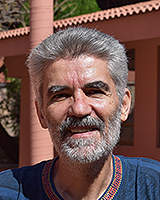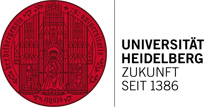‘Science has never been a local matter; that is true today more than ever’

Prof. Dr. Ignacio Barradas, Professor of Mathematics at the Centro de Investigación en Matemáticas (CIMAT) in Guanajuato/Mexico
Doctoral student at Heidelberg University’s Institute for Applied Mathematics from 1981 to 1985
When, how long and in what capacity did you stay at Heidelberg University?
I enrolled in the Heidelberg Institute for Applied Mathematics in April 1981. I wanted to earn a doctoral degree in mathematics and biology, which I succeeded in doing in July 1985.
Why did you decide to come to Heidelberg University?
I came to Heidelberg as a tourist in 1978 and found the city very interesting. I considered other options, but my decision was made when I discovered that there was a research group for biomathematics at the University. I interviewed with Prof. Dr Willi Jäger, and he was extremely helpful and invited me to join his group.
What were your experiences in Heidelberg?
The list of new and exciting experiences I was able to make is so long that I probably don’t even remember most of them. I’ll try to describe a few:
In the beginning, everything seemed very strange and foreign: the mealtimes, the food, the people, the business hours of the shops – everything was confusing and very different from what I was used to. For instance, I was very surprised to discover that pretty young girls ate alone in the cafeteria without anyone trying to strike up a conversation with them. That would never have happened in Mexico.
People were very interested in talking to foreigners, especially those hailing from ‘exotic places’. I was invited to dinner several times because I was from Mexico. That was very nice, but I was a bit mystified by it. German punctuality, which seemed extreme to me, was something I found very interesting, but slightly obsessive. I could see how efficient it was, but sometimes I felt that people paid more attention to the clock than to other people.
I made many new friends, and I learned (but never really abided by) the rule that you can’t just visit friends whenever you feel like it (something that is absolutely normal in my culture). That is how I first came across the expression ‘sich bei jemandem anmelden’. A very good German friend explained that ‘you can’t just turn up on somebody’s doorstep’. To this day, this friend welcomes me with a smile when I visit him unannounced.
I also learned that people from other countries may look different or act differently on the surface, but that in the end, we all want to be happy, share experiences with each other and, most of all, contribute something to humankind and perhaps make it a little better. Your passport, your language, the way you look, these are random things – it’s people who are important.
Also, I met and married my wonderful wife in Germany. What else can I tell you about my experiences? I really did lose my heart in Heidelberg, in more ways than one.
How did your career continue and how was it influenced by your time in Heidelberg?
After completing my studies, I returned to Mexico. I found a job at the university, but I always loved to return to Germany, especially to Heidelberg. Part of the reason is obviously that my wife is German and we have family and some very good friends in Germany. Several of my students obtained doctoral degrees in Germany and even decided to make their home there. The connection to Germany, and especially to Heidelberg, is always there. But I did spend time doing research in other countries for professional reasons.
How would you rate the German scientific community compared to your home country or other countries in which you have conducted research?
As far as mathematics goes, I don’t think there are significant differences in the countries I know. We have similar objectives and very similar ways of achieving them. We meet with colleagues working in the same field, we visit each other and attend the same conferences. And we labour under the same trends – such as points systems that determine research funding.
How much importance do you attach to international exchange for scientists?
Science has never been a local matter; that is true today more than ever. Even 30 years ago, it would have been impossible to contribute anything interesting to a given field without being in contact with international colleagues – today it would be an absolute waste of time to conduct a research project in isolation.

